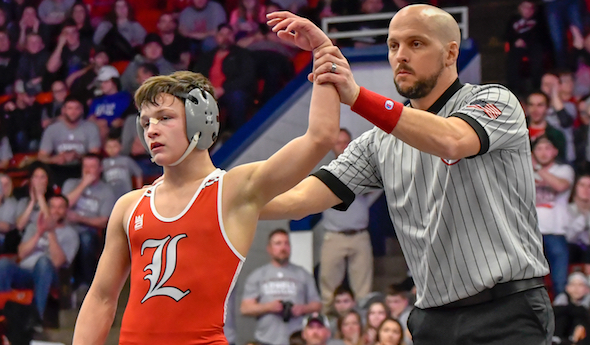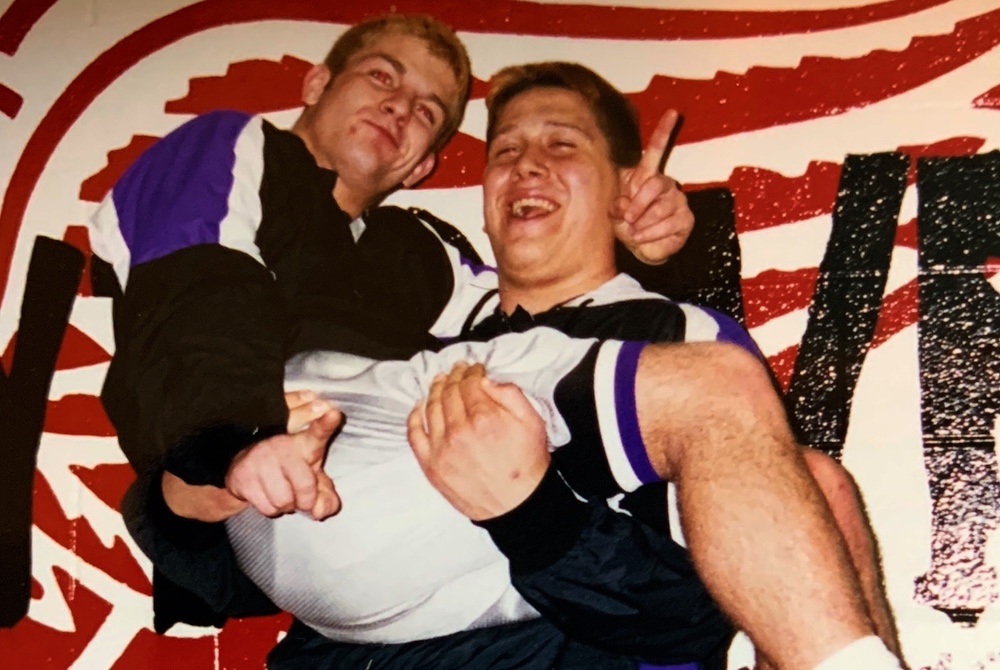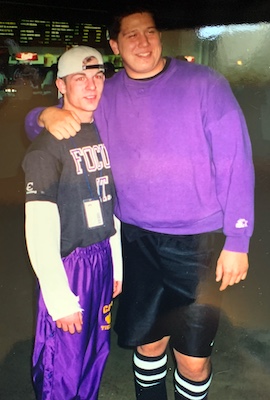
Lowell Sets Record With 6th Straight Title
By
Paul Costanzo
Special for MHSAA.com
February 23, 2019
KALAMAZOO – Jeff Leach was in a familiar place as he stepped onto the mat with a chance to clinch the MHSAA Division 2 wrestling team title for Lowell.
In 2017, Leach clinched the Red Arrows’ fourth straight title with a decision against Warren Woods-Tower. And Saturday, he did it again, defeating Goodrich’s Carson Turnbow 9-2 to give Lowell a 29-23 victory and a state-record sixth straight MHSAA Finals team championship.
“It’s a lot of pressure,” Leach said. “Coaches were talking to me before because I was pacing back and forth with my nerves, but they reminded me, ‘Surrender the outcome. No matter what happens, put it all right where you got it, right here on the big stage.’ It’s my last time wrestling here, my last time wrestling a high school state, so I thought I might as well do it for them so they can keep the tradition going after I’m gone.”
Prior to Saturday, Lowell was one of four Lower Peninsula teams to have won five straight titles, joined by Hudson (2009-13), Davison (2002-06) and New Lothrop (1984-88). Escanaba won six straight Upper Peninsula titles from 1976-81. (The tournament was unified in 1988.)
Now the Arrows stand alone as the only program to accomplish the feat with the entire state competing together.
“Wrestling is a difficult sport,” Lowell coach R.J. Boudro said. “We have to take care of these kids’ weights, their grades, making sure they’re not injured, just making sure they’re mentally there – their girlfriend breaks up with them – so many things that could go wrong. To think of all those things that could go wrong, and we won six in a row, it’s just an amazing feat. I’m proud of the community, proud of the kids – it’s so cool.”
Four of the previous five titles for Lowell were decided by 10 points or more, and wrapped up prior to the final match – in some cases, well before. Only the 2014 title was decided by fewer points than this year, as the Red Arrows started their streak with a 35-34 win against the previous Division 2 power, St. Johns.
“Goodrich is a heck of a team,” Boudro said. “They brought everything they had. I feel like through the year, they were kind of working their lineup down to beat us. It kind of gave us motivation. Our guys showed up, and we had plenty of opportunities to win the dual in a lot of different ways, but I think we wanted to give the fans something to get a little nervous. They’re spoiled fans.”
Each team won seven matches in the dual, but Lowell was able to get a technical fall from Avry Mutschler at 140, a pin from Nicholas Kohorn at 112 and a forfeit to Austin Boone at 160. Goodrich, meanwhile, was only able to get bonus points at two weight classes, major decisions from Honour Kline at 215 and Cameron Macklem at 119.
 “I think the worst part about it is that we wrestled so well and tough and we came up short,” Goodrich coach Kenneth Sirignano said. “That’s the worst part. To come that close and come up short – we did that in 2016, we did it again today, and that’s the worst part of it. They should have been rewarded for what they did, but that’s life and that’s a life lesson. They’ve really learned a lot this year, and I’m really proud of them. I just wish they could have had it.”
“I think the worst part about it is that we wrestled so well and tough and we came up short,” Goodrich coach Kenneth Sirignano said. “That’s the worst part. To come that close and come up short – we did that in 2016, we did it again today, and that’s the worst part of it. They should have been rewarded for what they did, but that’s life and that’s a life lesson. They’ve really learned a lot this year, and I’m really proud of them. I just wish they could have had it.”
Lowell went up 17-0 in the dual, getting decisions from James Fotis at 145 and Doak Dean at 152, along with Mutschler and Boone’s wins. Goodrich stormed back, however, winning the next four matches, as Kline’s major decision was surrounded by decisions from Juwan Vines at 171, James Penfold at 189 and Blake Coffell at 285. Vines won on a last-second throw, while Coffell won in double overtime.
“We pulled a lot of upsets, and we just tried to give ourselves the best shot to win,” Sirignano said. “The guys came through, and they won a lot of big matches. I would say they won five big matches.”
Lowell’s Ramsy Mutschler won by decision at 103, and that, combined with Kohorn’s pin, gave the Arrows a 26-13 lead with four matches to go.
The Martians won the next three, as Macklem’s major decision was followed by decisions from Carson Richards at 125 and Caleb Teague at 130. That set up the dramatic final match.
“We draw a weight class (to start the dual) an hour before, they drew 140 and I was like (yes),” Boudro said. “Two years ago, we beat Tower and it came down to him and he pulled it out. He’s got a lot to talk about for the rest of his life, being able to say he won two state titles in the last match of the dual. It’s pretty cool.”
Leach got out to a 5-0 lead in the match and had to hold off a pair of throws from Turnbow, rolling through one headlock that nearly put him to his back.
“It was more of a reaction,” Leach said. “My (practice) partners, some of them throw really good headlocks, so over the years, I’ve been pretty much practicing how to defend a headlock over and over.”
Lowell advanced to the Final with a 34-24 win against Gaylord in the Semifinals, while Goodrich defeated DeWitt 37-22.
Both Mutschlers and Fotis won three matches on the weekend for Lowell, while Vines, Penfold, Kline, Coffell, Macklem and Teague each won three matches for Goodrich.
PHOTOS: (Top) Ramsy Mutschler earned a key championship match win for Lowell at 103 pounds. (Middle) Wrestlers lock up during the Division 2 Final. (Click for more from HighSchoolSportsScene.com.)

Caro Champs Find Common Ground Again as Mental Health Providers
By
Paul Costanzo
Special for MHSAA.com
July 8, 2021
Phil Millerov and Phil Niklowicz wanted to do more than simply defeat opponents when wrestling at Caro High School.
They wanted to dominate – physically and mentally.
 “We had this thing between us where we wanted to be done, and (opponents) didn’t want to come back on the mat with us,” Millerov said.
“We had this thing between us where we wanted to be done, and (opponents) didn’t want to come back on the mat with us,” Millerov said.
Twenty years later, both spend their days building people up. Millerov is a licensed professional counselor, while Niklowicz is a licensed therapist.
“I went out there looking to dominate and make sure it was known that I am the superior wrestler in all facets,” Niklowicz said. “I would try to run up as many points as fast as I can. I would teach the same thing when coaching, specifically with my nephew. You’re saying, ‘Listen, we want to break these people.’ Then the next day, in a therapy session, it’s like, ‘Let’s build up your self-esteem and set some goals to boost ourselves up.’”
The close friends and two faces of Caro’s surging wrestling program in the late 1990s now have very similar careers. Millerov – who finished second, third and first at 275 pounds in the 1998, 1999 and 2000 MHSAA Finals, respectively -- works in private practice at Transitions Counseling Service in Greenville, where he specializes in substance abuse disorders. He also has served as a Class 1 Fellow at the WK Kellogg Foundation.
Niklowicz – a two-time MHSAA Finals champion (1999 and 2000) and four-time placer – is working in private practice in Southfield, seeing mostly children. He also works in adult foster care with patients who have had traumatic brain injuries.
“He and I went and hiked Pictured Rocks at the beginning of May,” Millerov said. “And we joked about how nobody would have guessed that we’d be doing this now.”
That Millerov and Niklowicz are still close does not come as a surprise. Their friendship began when their wrestling careers did, as 6-year-olds in the Caro Growlers program. As they were becoming two of the state’s top wrestlers, they would share rides to tournaments, and their families grew close.
In high school, despite their size difference – Niklowicz wrestled at 135 his senior year – it wasn’t uncommon to see them warming up together.
“We were definitely easy going and liked to mess around a lot,” Niklowicz said. “We used to mess around before meets and throw each other. He would jump and I would throw him. People would look at us like, ‘Why is that little guy throwing that big guy?’”
 While their teams never made it out of the Regional, Millerov and Niklowicz helped set the stage for a program that would become among the best in Division 3 throughout the 2000s, qualifying for five straight Quarterfinals from 2003-07 and winning the Division 3 Finals title in 2003.
While their teams never made it out of the Regional, Millerov and Niklowicz helped set the stage for a program that would become among the best in Division 3 throughout the 2000s, qualifying for five straight Quarterfinals from 2003-07 and winning the Division 3 Finals title in 2003.
Individually, they were among the most well-known and feared wrestlers in the state.
“Niklowicz and I were fortunate to have each other, because we pushed each other,” Millerov said. “We were in constant competition with each other and ourselves. Just to kind of push each other, it was a great thing.”
Niklowicz finished fifth as a freshman and third as a sophomore before winning back-to-back titles to close out his career. In 1999, he defeated Nick Oertel of Goodrich 9-2 in the 125-pound final, and the next year he defeated Oertel’s teammate, Ryan Tripp, 7-5 at 135. Tripp would go on to win an individual title the following year. Niklowicz would finish his career with 214 victories.
“I think probably both (Finals titles) were equal,” Niklowicz said. “I think there was probably a little more stress going into my senior year. My motivation always came from improving, then it was maintaining the state title. You don’t want to go the opposite direction.”
Millerov lost a tight 6-4 decision against Remus Chippewa Hills’ Bob Kozlowski in the MHSAA Finals as a sophomore, and had an epic 12-10 match against future NFL defensive lineman Jason Babin of Paw Paw in the 1999 semifinals before fighting back to take third. The next year, he won his title via first-period pin against Dan Kliphuis, a two-time runner-up from Grand Rapids West Catholic. Millerov finished with 196 career wins and set the state record for pins in a career (160), which was broken the next season by Nick Simmons of Williamston and is now held by Justin Zeerip of Hesperia. The 56 pins Millerov recorded his senior season remains second all-time to Simmons, who had two seasons with 57.
“I never really thought about (the pin record) to be quite honest,” Millerov said. “It was just kind of in the background. It didn’t matter; all I cared about was winning this match, and I wanted to do it in the most effective, efficient way I could.”
They both continued their wrestling careers, but went their separate ways in college, with Millerov heading to Neosho County Community College in Kansas and Niklowicz to Virginia Tech.
Millerov had interest from several Division I schools coming out of high school, including some in the Big Ten, but he admits his grades weren’t good enough at the time. Neosho provided a chance to compete with some of the best in the country while at the junior college level, however, as the team took second at the National Junior College Athletic Association championships in 2002.
He transferred to Central Michigan after his sophomore year, joining his girlfriend – now his wife – who was already attending, and walking onto the wrestling team. While his relationship lasted, wrestling did not.
“I was distracted,” Millerov said. “My grandmother passed away in 2002 in that summer. I was trying to get that motivation back, and I just lost it. There has to be that edge with wrestling. When things didn’t work out, I struggled. Wrestling was my identity.”
Millerov was working to follow in his father’s footsteps and become a police officer. But the elder Phil Millerov, who died in 2012, talked his son out of it.
“Looking back on it, for me, it was obviously the right decision,” Millerov said.
The idea to go into counseling came after Millerov was married in 2006, as his wife had gotten into the program. He went back to school to earn his bachelor’s degree from CMU in 2007, and would go on to get his master’s from CMU, as well.
“I had taken a bunch of psychology courses just because I liked the field,” Millerov said. “I liked to be challenged. I liked puzzles, and with psychology, it’s like a new puzzle every hour. It just clicked. I flew through and graduated with like a 3.8. I was like, ‘Wow, I kind of feel smart.’ It was good to find something I was passionate about again.”
Millerov said he’s constantly learning and honing his craft, much like he did as a wrestler. A major difference now, however, is that he’s found more balance in his life.
“I think about working with athletes in addiction, I find a lot of similarities,” he said. “Wrestling was my life, it’s how I identified myself. I hear that same kind of talk around people struggling with addiction. One you’re considered successful for, the other you’re not. Most of my growth has been around finding balance. I find that my happiness and my clients’ as well, is when we found that balance instead of being good at just one thing. I want you to have passion, I want you to do things you love, but I also want you to be effective as a husband, a father, whatever other responsibilities you have.”
 Niklowicz’s journey to becoming a therapist was more telegraphed, as both of his parents work in mental health, and he said it was always something he wanted to do, as well.
Niklowicz’s journey to becoming a therapist was more telegraphed, as both of his parents work in mental health, and he said it was always something he wanted to do, as well.
He attended Virginia Tech on a wrestling scholarship, but transferred to Eastern Michigan after one year. The Hokies had recruited him to wrestle at 133 pounds, but when the team’s 125-pounder was injured, Niklowicz was asked to cut down further. Like Millerov, he struggled when his wrestling career ended.
“I just had a really bad taste in my mouth after leaving Virginia Tech and trying to cut all this weight,” he said. “Some of it was I had lost the desire to work out, to wrestle. Fifteen years, roughly, of my life was dedicated to wrestling, and once you stop, what do I do with my winters? What do I do with seven months of the year? It was definitely a part of my identity; that’s why I got into coaching. I did MMA fighting for a little bit to have something competitive.”
Like Millerov, Niklowicz said finding balance was important.
“In the mental health field, specifically, there’s a lot of burnout for people,” he said. “Every day, you’re listening to people talking about their problems, but at the same time, they’re coming for a reason and they’re there for help, so you have to provide that help and have to motivate yourself to come to the office every day and give it your best. I try to instill the motivation that I used to other people.”
When Niklowicz looks at his time as an athlete compared to his work as a therapist, he said that work ethic is the main characteristic that has carried over.
“I think my practice mentality was the same as it was on the mat,” he said. “Even in the wrestling room, these are people I’m friends with, people I grew up with, and I still didn’t want anyone to score on me. Then you just look at your work ethic outside of wrestling, whether you’re studying for exams or motivating yourself to get up and go to class.”
While they are no longer living in the same town or living similar lives – Millerov is married with three kids, while Niklowicz is single – the connection between Caro’s dominant duo remains strong, both professionally and personally.
“I don’t think we ever thought we would be going down such a similar path, and I doubt that either one of us grew up thinking we would do the exact same thing,” Niklowicz said. “We met when we were 6 years old, and we’ve been best friends forever. I think it’s hilarious that we’ve taken such similar paths but with some glaring differences. It’s definitely interesting that we’re still really good friends after 30-some years, especially since we’ve moved on and gone our separate ways.”
2020-21 Made in Michigan
June 28: Michigan's Minor Leaguers Making Up for Lost Season - Read
PHOTOS: (Top) Caro’s Phil Millerov lifts teammate Phil Niklowicz as both celebrate Division 3 championships during the 2000 Individual Finals at Joe Louis Arena. (Middle) Niklowicz, left, and Millerov were high school warm-up partners despite wrestling at significantly different weights. (Below) Niklowicz and Millerov take a selfie during a hiking trip to Pictured Rocks National Lakeshore in May. (Photos courtesy of Niklowicz and Millerov.)

